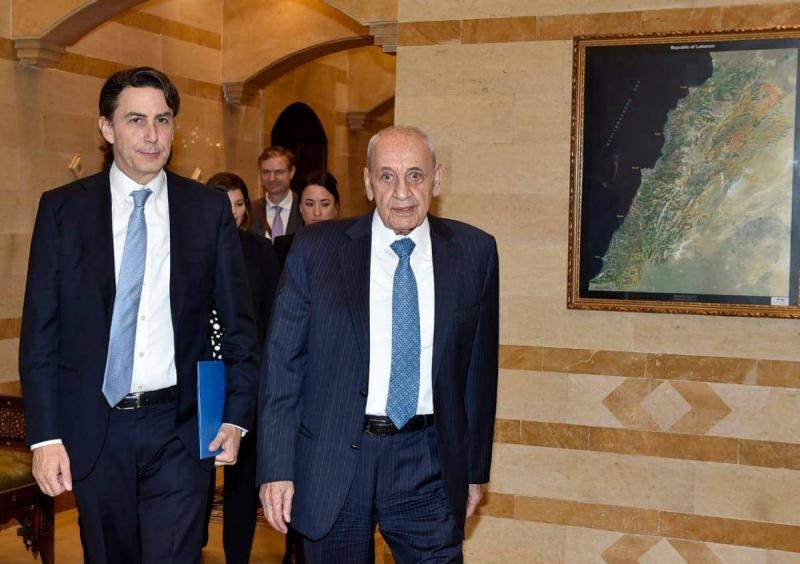The U.S. administration has hastened to send its envoy, Amos Hochstein, to Israel and Lebanon to contain the escalation that apparently followed Israel’s assassination of a Hezbollah leader in southern Lebanon. In reality, the escalation that threatens a full-scale war did not occur solely after the assassination and the launch of hundreds of rockets; it actually took place following Biden's initiative two weeks ago to cease fire in Gaza, an initiative he claimed was agreed upon with Netanyahu. Iran quickly opposed it, voiced by Khamenei and the interim foreign minister who visited Beirut to discuss matters with the party leader, and perhaps with Hamas, to prevent compliance with Biden's initiative. Until now, Hamas's response remains unclear, and Netanyahu is preoccupied with a fracture in his war cabinet following Benny Gantz's resignation while the party shifts its rockets towards the northern entity and the Golan.
There is a wide wave of Iranian tension occurring on multiple fronts and in various forms. In southern Lebanon, there has been a notable increase in Houthi attacks on commercial ships in the Red Sea, Gulf of Aden, and Mokha. Despite fierce American and British responses in various parts of Yemen targeting drone launch sites, radars, and speedboats, ship damages have risen. Interestingly, U.S. military officials recently stated that the Houthis have devised new methods to acquire weapons via Lebanon and Djibouti, with a merchant from the Al-Wazir family being central to purchase and smuggling operations. Another noteworthy conclusion reached by U.S. officials is that they are compelled to reconsider their campaign against Houthi attacks on ships in the Red Sea and the ocean, indicating a need for participation from regional "allies" in this war.
Undoubtedly, the regional actors are heavily affected, yet they lack the advanced combat capabilities possessed by Americans, British, and other Europeans. If they have failed to mitigate the harm caused by the Houthis, how can others make an impact? U.S. officials added that arms smuggling to the Houthis sometimes involves vessels linked to China, which have been sanctioned, even as the Chinese are also suffering from attacks at sea.
The third front that Europeans and Americans are complaining about is the nuclear front. Grossi, the director of the International Atomic Energy Agency, stated that the agreement with Iran is no longer respected by anyone and that Iran has recently exceeded all limits regarding uranium production at the "Fordow" site, which it does not allow inspections of. Europeans are enthusiastic against Iran’s violations, issuing sanctions against entities within Iran, yet these measures seem to have no significant effect.
It is no longer possible to "waste time," as the Lebanese say, about confrontation, which exists between whom and whom. Since the "Al-Aqsa Flood" around nine months ago, the United States has overtly intervened alongside Israel with its fleets, bases, aircraft, and intelligence. The argument then was to prevent the war from expanding from Iran through the "unity of fronts" called for by Nasrallah. However, an expansion did not occur even when Iran had to intervene directly against the entity after its consulate and its officers in Damascus were attacked. Yet, the United States continued intervening significantly, until we learned that a special American unit participated in the release of four Israeli prisoners in Gaza!
For decades, U.S. policies towards Iran have been containment-oriented, meaning they do not always respond to confrontation in kind. Instead, they limit their responses to attacks. As a result, Iran has always come out ahead, even if it has not achieved all its goals. It is now noticeable that Iran is in a moment of confrontation. On the other hand, the United States is reverting to policies of absorption and containment, despite direct face-to-face engagements: sending mediators to Oman, dispatching Hochstein to Israel and Lebanon, leaving the issue of confronting Iranian nuclear advances to the Europeans, and seeking new supporters in the confrontation with the Houthis while insisting that it only engages defensively against targeting plans.
It is not easy to determine Iran's reasons for the current escalation and tension. As for the "wisdom" of the Americans—if deploying fleets is ineffective, it may relate to the presidential elections and the necessity of avoiding a major war on the horizon. It also pertains to the sensitivity of the strategic situation and the multiplicity of fronts between Ukraine, Palestine, and the South China Sea. However, American caution is met with Iranian boldness and a determination to avoid returning empty-handed. What does Iran hope for, and what can the Americans offer or provide?




